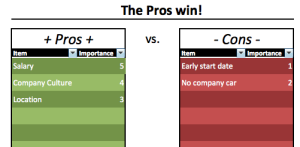There are two ways as a college student you can spend your time before interviewing for full-time positions your senior year.
Option one is to play the guessing game where you do things during college and hope by blind luck that they work out to get you a quality job after graduation.
That approach works for a few people, but for others it’s a crap shoot that sometimes leaves them unemployed. And my college friends who didn’t secure a job after graduation do regret where they spent their time during their four years.
Option two is to understand what skills employers want from the start, and then use this knowledge to build impressive skills and experiences that align with what companies look for.
With this option, you come with a perspective of the future—without any time machine travel—and work in the present to reach success.
When you prepare this way, interviews become a breeze and you kill the job search. Then the hardest part is deciding between all your job offers—such a rough life.
So what situation sounds better to you? Since you’re smart enough to read this, you know option two is going to unlock a much better future than option one.
Companies Look For These Skills
Alright, now that you’re committed to preparing the right way in college, we need to break down the specific skills companies look for in candidates.
For reasons I’ll explain below, organizations love applicants who possess leadership, communication, problem-solving, and strategic thinking skills.
Leadership
Having leadership experience is the golden nugget for your resume and the interview process. Companies evaluate leadership experience highly because it points toward your ability to manage a team, be respected enough to get voted the leader, and direct moving parts to accomplish a goal.
I’ve found that leadership experience far outweighs GPA in terms of importance for most positions, which is surprising. This goes to show that a soft skill like leadership can lead (pun intended) to better job prospects than hard skills like proficiency in finance or economics.
Next time a leadership opportunity presents itself in your dorm, student org, fraternity, or elsewhere, jump all over it.
Communication
Being able to effectively communicate covers a wide range of skills including social skills, writing clear emails, and telling your manager exactly what they need to know—and don’t need to know.
You can either be a breath of fresh air to work with based on how you communicate, or a nightmare because your communication is often vague and confusing—see the words successful people don’t say.
And communication skills are not some natural talent that you’re born with or stuck without. Just as you can improve your ability to speak Spanish with practice, you can better communicate through practicing body language and your speech.
Problem-Solving
Since humans aren’t perfect, every job and every organization is going to have issues. It’s the teams with the employees who are adept at problem-solving that rise to the occasion and perform.
That’s why employees who can remain calm and keep a positive attitude in the face of a problem are key contributors to any organization.
If you can communicate in your interview a time when you overcame a heavy obstacle and fixed it, companies will badly want you. If you have two or three examples of problem-solving, this is even better for your job hunt.
Strategic Thinking
Last but not least, strategic thinking is a crucial attribute for employees. Strategic thinking involves planning ahead, predicting the future to a certain degree, and getting the most out of your current information.
A short-term thinker may overvalue present situations and thus lose out on opportunities to make gains in 6 or 12 months down the road.
A planner will capitalize on the present while planting seeds to reap the benefits in the future.
Or, for example, a strategic thinker will have the wisdom to seek out mentors in the organization on their own.
Having this skill is worthwhile because it’s hard for employers to teach, but obvious when certain candidates have it and others don’t.
What You Can Do To Impress Employers
We have uncovered that employers are all about finding job applicants who can effectively express their ideas and work well with others to establish a winning team.
Now it’s time for you to get experiences that both force you to work on these skills and give you the resume lines to prove it to employers. Obviously if you can’t promote these skills somehow, the employer isn’t going to know you have them even if you do.
What are some activities that will stretch your leadership, communication, problem-solving, and strategic thinking skills? Here’s a few I thought of and my comments:
1. Join a student org exec team: Being on an executive team for a student org might be the most valuable college experience for your future career. You’ll be left in the ocean to sink or swim depending on your skills in all four of these areas: leadership, communication, problem-solving, and strategic thinking.
If you can’t lead your team well or the student group, you’re toast.
If your communication is misleading or ineffective, then you’ll suddenly lose membership.
If problems aren’t solved in the right manner, broken relationships on the exec team will trickle down to negatively influence the entire student org.
And if you don’t have creative ideas to improve attendance or engage the current membership, they will let you know by refusing to go in the future.
Also, serving on a student org exec team will test your patience. It’s not surprising that this quality works well in a full-time position when you work under the deadlines of coworkers, clients, or managers.
I would know about these struggles as I learned a lot about leadership in my time as president of Amicus Curiae Pre-Law Society.
2. Go Greek (and get a leadership role): Joining a fraternity or sorority is often a heck of a good time for many college students. The bonus is that going Greek also aids your communication and problem-solving skills.
For example, one c-level executive at 3M talked to me and said he used to be incredibly shy before he joined a fraternity. But this Greek environment helped him become more outgoing and talkative, which is the reason why he’s done so well after graduating. He continues to get promoted because he’s now an expert in managing people and handling personalities.
And if you really want to test and improve your leadership skills, then join the leadership team of a fraternity or sorority. These experiences will build up skills that will do wonders for your work in the real world. If you saved your organization from social probation, you can handle when your department is about to go over budget.
If you’re curious, I list many other benefits of Greek life in this post, although I didn’t join a fraternity at Miami.
3. Study abroad: Because being in a foreign country forces you out of your comfort zone, it requires you to improve your communication, problem-solving, and strategic thinking skills on the spot.
How are you going to get to your destination? You’ll need to communicate with your group or the locals—even if you don’t know the language. How are you going to navigate the train schedules to fit in all of your activities? This requires problem-solving and strategic thinking.
As you see, studying abroad helps your future and is also a great time in the present.
4. Play sports: If you’re a student-athlete, employers will immediately value your skills. It’s known that most athletes possess leadership ability and work well in teams. This is exactly what skills employers want to see.
And this is the same reason you see companies through television ads broadcasting about how many student-athletes they hire.
But for you former high school athletes, you can still lace up your shoes to play club or intramural sports and improve your hirable qualities.
For example, I used a story from when I captained an undefeated intramural basketball team as one of my interview answers to a behavioral question about my competitiveness. The employer laughed and loved it.
And usually the interviewer will ask you if you played sports in high school, and that’s a way for you to plug in the glory days without bringing it up yourself. Although high school sports are less impressive than being a college student-athlete, it still shows positive for you.
Talking about this activity is also effective because almost everyone can relate to sports, which makes it easy to find a common ground during the interview process.
5. Start a major project: I’m a huge believer in starting a side hustle that you are interested in (and ideally make money from it, but you don’t have to).
For example, I started TakeYourSuccess.com in college and this has led to big results. That’s why I know for a fact that creating a blog will force you to get better at communicating and problem-solving.
Maybe the best thing you can do is start a business in college, but that’s only for a few of you so I won’t go into too many details.
However, other major projects are beneficial too, like founding a student org, serving a local community, or running a small business’s social media. Any major project will teach you life lessons and give you an impressive resume line.
Final Words
Depending on your campus location and how much free time your schedule allows, the opportunities to get involved in experiences that will improve your skills are endless.
Your time is well spent developing these skills in leadership, communication, problem-solving, and strategic thinking. Remember that spending a few years improving in this areas now will give you the precise tools to excel in any job and career. Or have the skills to transfer jobs if you’re not happy at work.
And no company will get rid of you, regardless of the economy, when you produce consistent value because of your foundation in these skills.
Like this post? Take your job search to another level with my Amazon bestselling book The Golden Resume.
Did you know what skills employers wanted before reading this? How does knowing this influence what you spend your time doing? Feel free to leave any other comments or thoughts below.



